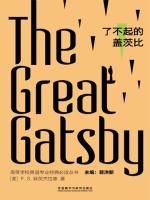"The Great Gatsby": A Hymn of Dreams and Reality
肆凌
For me, F. Scott Fitzgerald's "The Great Gatsby" is a
profound exploration of dreams and reality. After reading this book, I
felt as if I had experienced an emotional journey where the grandeur of
dreams and the harshness of reality intertwine. Gatsby, a character in
the book, left a deep impression on me. He represents a pursuing heart,
tirelessly chasing his dream. Everything he does, including accumulating
wealth and throwing luxurious parties, seems to be for winning back his
long-lost love, Daisy. Gatsby's persistence touched me deeply; however,
it also made me feel his tragedy——in his pursuit of an unreachable
dream. This made me reflect: how do we maintain our original intentions
in a cold reality? And when to let go of those impossible dreams?
What's even more thought-provoking is that the ending of the novel isn't
a happy one. Gatsby's efforts end tragically, and Daisy fails to meet
Gatsby's expectations of her. The dream under the flickering green light
is like a mirage in a desert, beautiful yet unreachable. Gatsby's
tragedy lies not only in his unrequited love but also in the shattering
of his American Dream. This made me realize that although chasing dreams
is beautiful, facing reality rationally is crucial. Through the story
of Gatsby, Fitzgerald seems to remind us that though dreams are
necessary, the chasm between dreams and reality is often filled with
countless challenges and difficulties. We should strive for our dreams
but also arm ourselves with rationality, recognizing when to pursue and
when to let go. "The Great Gatsby" is not just a story about
love and dreams; it's also a reflection of an era, discussing the
disparity between rich and poor, and the emptiness and vanity underlying
the seemingly golden era. Through Gatsby's life, Fitzgerald depicts an
extraordinary era and its people, prompting me to ponder how to find
one's place in the rapidly changing modern society.



 京公网安备 11010802032529号
京公网安备 11010802032529号